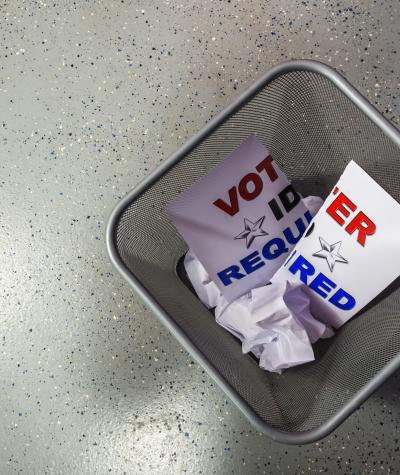The fight to stop flagrant voter suppression against Native American tribes continues in the courts.
Currently, North Dakotans can’t vote unless they have identification that shows their name, birth date and residential address. The problem is, many Native Americans living on reservations do not have or do not know their residential addresses, and therefore do not have IDs that meet this requirement.
In October 2018, CLC joined with the Native American Rights Fund to bring a case in North Dakota court on behalf of the Spirit Lake Tribe, to ensure that Native American citizens’ right to vote is not harmed by the state’s failure to develop a functional home addressing system on reservations.
*The case is called Spirit Lake Tribe v. Jaeger.
The voter ID requirement makes ballot access more difficult for Native Americans living on or near reservations in North Dakota. As the state was well aware when they passed the ID law, Native Americans face unique burdens in obtaining valid ID for voting, particularly because many of them rely on P.O. boxes, rather than using a street address. The failure to assign or communicate residential addresses to Native American residents was – and continues to be – a problem of the state’s own making, and which it has had six years to fix. Many roads on North Dakota reservations have been assigned multiple, conflicting names, and many homes have been assigned multiple, conflicting numbers. The state has not provided the Spirit Lake Tribe any resources, financial or otherwise, to assist members in obtaining IDs that meet its requirement.
While the judge in charge of the case expressed concern about the disarray of the state’s voter ID system before the 2018 midterm elections in a Nov. 1, 2018 order, he declined to take action in the case because he thought it was too close to Election Day.
Read the stories of six North Dakota residents that described their challenges accessing the ballot while living on the Spirit Lake Reservation in the days leading up to the 2018 elections.
CLC supplemented its lawsuit with a new filing on Feb. 28, 2019, with the Standing Rock Sioux Tribe joining the action as a plaintiff based on the harms caused to the tribe and its members by North Dakota’s voter ID law, and adding additional evidence of the discriminatory way that the legislature implemented the law. CLC is asking the court to restrain the state from applying its voter ID law to Native American voters who live on or near reservations in North Dakota, and face unique barriers to obtaining qualifying ID.
Standing Rock has approximately 5,868 residents of voting-age that could be affected by the state’s law. In the final stretch before the 2018 election, Standing Rock spent thousands of dollars and countless staff hours ensuring its members had access to qualifying ID, and expects to continue to expend resources protecting its members’ right to vote in future elections.
